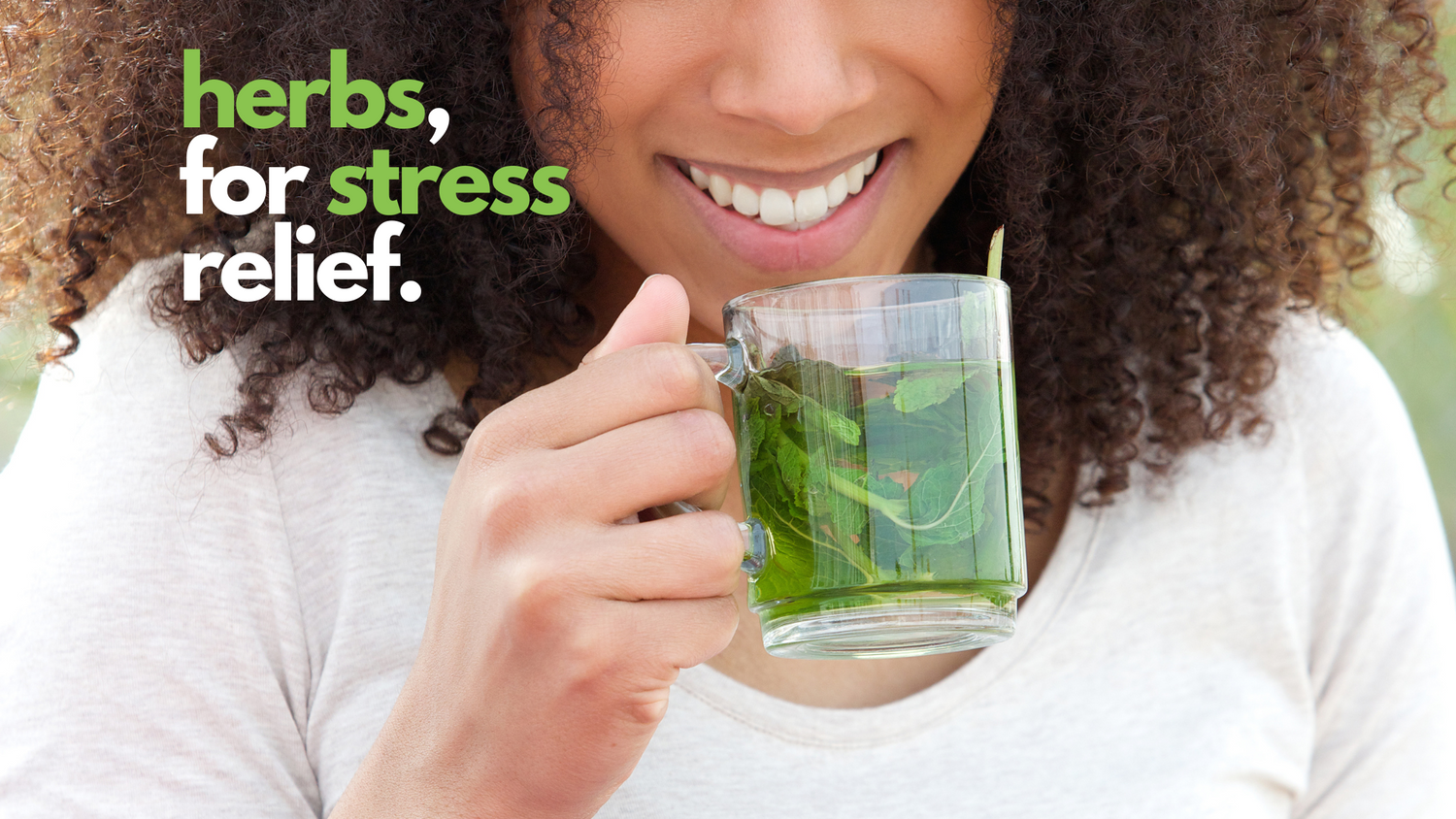In today's fast-paced and demanding world, finding effective ways to manage stress and anxiety has become more important than ever. While there are various methods available, one approach that has gained significant attention is the use of herbs for calming. These natural remedies have been used for centuries to promote relaxation and alleviate feelings of stress and anxiety.

Herbs for calming offer a holistic alternative to traditional medications, providing individuals with a natural way to find relief from the pressures of everyday life. By harnessing the power of nature, these herbal remedies can help restore balance in both the mind and body.
Let’s explore some commonly used herbs for calming, their benefits, and how they can be incorporated into daily routines. Whether you are seeking anxiety relief or simply looking to enhance your overall sense of well-being, understanding the potential benefits of herbal remedies for relaxation can be a valuable tool in your self-care arsenal.
Lavender: The Soothing Herb that Promotes Relaxation and Sleep
Lavender, a fragrant herb known for its soothing properties, has been used for centuries to promote relaxation and improve sleep quality. This versatile plant offers numerous benefits that can enhance overall well-being.
One of the most popular applications of lavender is through its essential oil. Lavender essential oil is derived from the flowers of the plant and is commonly used in aromatherapy. When inhaled, the calming scent of lavender can help reduce anxiety and stress levels, promoting a sense of tranquility and relaxation.
Many people find that incorporating lavender aromatherapy candles into their self-care routine allows them to unwind after a long day or find solace during moments of heightened tension. Whether used during meditation, bath time, or simply while reading a book before bed, these candles offer an opportunity for individuals to prioritize their mental and emotional well-being.
In addition to aromatherapy, lavender can also be consumed as a tea. Lavender tea is made by steeping dried lavender flowers in hot water. Drinking this herbal infusion has been found to have sedative effects, making it an excellent natural remedy for those struggling with insomnia or restlessness.
The calming properties of lavender extend beyond promoting relaxation and sleep. Research suggests that lavender may also have mood-boosting effects, helping to alleviate symptoms of depression and anxiety disorders.
Overall, incorporating lavender into your daily routine can have numerous benefits for both mental and physical well-being. Whether through using lavender essential oil in diffusers or applying it topically, enjoying a cup of soothing lavender tea before bed, or simply surrounding yourself with the pleasant aroma of fresh lavender flowers, this herb provides a natural way to unwind and promote relaxation in our fast-paced lives.
Chamomile: A Gentle Herb to Ease Anxiety and Promote Restful Sleep
Chamomile, a gentle herb known for its calming properties, has been used for centuries to ease anxiety and promote restful sleep. Whether consumed as a tea or taken in supplement form, chamomile offers numerous benefits for those seeking natural remedies for stress and sleep issues.
One of the main benefits of chamomile is its ability to reduce anxiety. Chamomile contains compounds that interact with receptors in the brain, promoting relaxation and reducing feelings of tension. Many people find that drinking chamomile tea before bed helps them unwind and prepare for a restful night's sleep.
In addition to its calming effects, chamomile is also known to promote better sleep quality. Research suggests that chamomile can help improve sleep latency (the time it takes to fall asleep), increase overall sleep duration, and enhance sleep efficiency. This makes it an excellent option for those struggling with insomnia or other sleep disorders.
Chamomile can be consumed as a traditional herbal tea by steeping dried flowers in hot water. Alternatively, chamomile supplements are available in various forms such as capsules or liquid extracts. These supplements offer a convenient way to incorporate the benefits of chamomile into your daily routine.
It's important to note that while chamomile is generally considered safe for most individuals, it may interact with certain medications or cause allergic reactions in some people. It's always best to consult with a healthcare professional before starting any new herbal remedy or supplement.
Chamomile is a gentle herb with powerful calming effects that can help ease anxiety and promote restful sleep. Whether enjoyed as a soothing cup of tea or taken in supplement form, incorporating chamomile into your routine may provide natural relief from stress and support better overall well-being.
Ashwagandha: The Adaptogenic Herb that Helps Reduce Stress and Enhance Well-being
Ashwagandha, also known as Withania somnifera, is an adaptogenic herb that has gained popularity for its potential to reduce stress and enhance overall well-being. Derived from the roots of the plant, ashwagandha has been used for centuries in traditional Ayurvedic medicine.
One of the key benefits of ashwagandha is its ability to help reduce stress levels. It is believed to work by regulating cortisol, a hormone released in response to stress. By modulating cortisol levels, ashwagandha may help promote a sense of calmness and relaxation.
In addition to stress reduction, ashwagandha supplements or tea have been associated with a range of other potential benefits. These include improved sleep quality, enhanced cognitive function, increased energy levels, and even support for immune health.
Ashwagandha supplements are available in various forms such as capsules, powders, and extracts. It is important to note that while generally considered safe for most people when taken within recommended dosages, it's always advisable to consult with a healthcare professional before starting any new supplement regimen.
Whether you're looking for natural ways to manage stress or seeking overall well-being support, ashwagandha offers promising potential as an adaptogenic herb. Its long history of use in traditional medicine combined with emerging scientific research makes it an intriguing option worth exploring further.
Lemon Balm: A Refreshing Herb that Relieves Nervousness and Improves Mood
Lemon balm, also known as Melissa officinalis, is a refreshing herb that offers numerous benefits for both physical and mental health. Known for its calming effects, lemon balm has been used for centuries to relieve nervousness and improve mood.
One popular way to enjoy the benefits of lemon balm is through a soothing cup of lemon balm tea. The tea is made by steeping dried or fresh lemon balm leaves in hot water. It has a pleasant citrusy aroma and a mild, slightly sweet taste. Many people find that sipping on a cup of lemon balm tea helps them relax and unwind after a long day.
In addition to tea, lemon balm extract is another common form in which this herb is consumed. Lemon balm extract can be found in various supplements and natural remedies due to its potential health benefits. It contains compounds such as rosmarinic acid and flavonoids that are believed to contribute to its calming properties.
Studies have shown that lemon balm may help reduce anxiety, promote better sleep, and alleviate symptoms of stress-related disorders. It is thought to work by interacting with certain neurotransmitters in the brain, such as GABA (gamma-aminobutyric acid), which plays a key role in promoting relaxation.
Furthermore, lemon balm has been found to have mood-enhancing effects. It may help lift spirits and improve overall well-being. Some research suggests that it can even be beneficial for individuals experiencing mild depression or low mood.
It's important to note that while lemon balm is generally considered safe for most people when consumed in moderation, it's always advisable to consult with a healthcare professional before adding any new herbal supplement or remedy into your routine.
So if you're looking for a natural way to relax and improve your mood, consider incorporating lemon balm into your daily routine. Whether enjoyed as a comforting cup of tea or taken as an extract supplement, lemon balm offers a refreshing and calming experience that can help soothe nervousness and promote a sense of well-being.
Passionflower: A Natural Sedative Herb to Alleviate Anxiety and Promote Relaxation
Passionflower, also known as Passiflora incarnata, is a natural herb that has gained popularity for its potential benefits in alleviating anxiety and promoting relaxation. This beautiful flowering plant has a long history of traditional use in herbal medicine.
One of the key benefits of passionflower is its ability to help reduce anxiety symptoms. Research suggests that passionflower may have a calming effect on the central nervous system, leading to reduced feelings of restlessness and nervousness. It is believed to work by increasing levels of gamma-aminobutyric acid (GABA), a neurotransmitter that helps regulate brain activity and promote relaxation.
Passionflower supplements are available in various forms, including capsules, tablets, and tinctures. These supplements offer a convenient way to incorporate passionflower into your daily routine. However, it's important to consult with a healthcare professional before starting any new supplement regimen.
Another popular way to consume passionflower is through herbal tea. Passionflower tea can be brewed by steeping dried passionflower leaves in hot water for several minutes. This soothing infusion can be enjoyed before bedtime or during times of stress to help promote relaxation.
While passionflower shows promising potential as a natural sedative herb, it's important to note that individual results may vary. It may not be suitable for everyone, especially those who are pregnant or breastfeeding or have certain medical conditions or take specific medications.
Passionflower offers an intriguing option for individuals seeking natural alternatives for anxiety relief and relaxation promotion. Whether consumed in supplement form or enjoyed as a calming tea, incorporating passionflower into your wellness routine may provide you with the tranquility you seek amidst life's challenges. As always, consult with a healthcare professional before adding any new herbs or supplements into your regimen for personalized guidance and safety precautions.
Kava Kava: An Ancient Herb with Powerful Relaxing Properties for Stress Relief
Kava kava, also known simply as kava, is an ancient herb that has been used for centuries for its powerful relaxing properties. It is derived from the root of the Piper methysticum plant, which is native to the South Pacific islands.
One of the key benefits of kava kava is its ability to promote stress relief. The active compounds in kava, known as kavalactones, interact with the brain's receptors and help to induce a sense of calmness and relaxation. This makes it a popular natural remedy for those seeking relief from stress and anxiety.
Kava kava supplements are available in various forms such as capsules, tinctures, and powders. These supplements provide a convenient way to incorporate kava into your daily routine. However, it's important to note that the quality and potency of these supplements can vary, so it's essential to choose a reputable brand.
Another popular way to enjoy the benefits of kava is by drinking kava tea. Kava tea is made by steeping powdered or ground kava root in water. The resulting beverage has a unique earthy flavor and can be enjoyed hot or cold.
It's worth mentioning that while kava can offer effective stress relief, it should be used responsibly and in moderation. Long-term or excessive use of high-dose kavalactone supplements may have potential health risks associated with liver toxicity.
If you're looking for a natural remedy for stress relief, consider exploring the benefits of kava kava. Whether you choose to take it in supplement form or enjoy it as a soothing cup of tea, this ancient herb has shown promise in promoting relaxation and easing stress levels.
Embrace the Calming Power of Herbs for a Natural and Relaxing Lifestyle
In conclusion, embracing the calming power of herbs can greatly enhance your natural and relaxing lifestyle. Incorporating herbs into your daily routine can provide numerous benefits for both your physical and mental well-being.
Herbs such as lavender, chamomile, and valerian have long been known for their soothing properties. They can help reduce anxiety, promote better sleep, and alleviate stress. Whether it's through herbal teas, essential oils, or herbal supplements, incorporating these natural remedies into your routine can have a profound impact on your overall sense of calmness and relaxation.
Additionally, herbs offer a holistic approach to wellness. Unlike synthetic medications that often come with unwanted side effects, herbs are generally safe and gentle on the body. They work in harmony with our natural systems to restore balance and promote overall health.
Embracing the calming power of herbs also allows us to reconnect with nature. By cultivating our own herb gardens or sourcing organic products from local farmers or herbalists, we not only support sustainable practices but also deepen our connection to the earth.
In today's fast-paced world filled with constant stressors and distractions, it is essential to prioritize self-care and find moments of tranquility. Embracing the calming power of herbs is a simple yet effective way to create a natural and relaxing lifestyle that nurtures both body and mind. So why not explore the vast world of herbal remedies and discover how they can transform your well-being?









Leave a comment
All comments are moderated before being published.
This site is protected by hCaptcha and the hCaptcha Privacy Policy and Terms of Service apply.